Business Opportunities between Bangladesh and Brazil
Md. Joynal Abdin*
Business Consultant & Digital Marketer
Founder & CEO of Trade & Investment Bangladesh
Introduction:
In today’s interconnected global economy, the search for new business frontiers knows no bounds. As nations seek to diversify their trade portfolios and capitalize on emerging markets, the symbiotic potential between regions often goes untapped. One such promising nexus lies in the exploration of business opportunities between Bangladesh and Brazil.
Both countries, situated on opposite sides of the globe, possess unique economic landscapes characterized by burgeoning industries, dynamic labor forces, and a drive for innovation. Bangladesh, renowned for its prowess in textiles, agriculture, and pharmaceuticals, stands as a beacon of economic resilience and rapid development in South Asia. Meanwhile, Brazil, with its vast natural resources, robust manufacturing sector, and technological advancements, commands a formidable presence as one of Latin America’s largest economies.
The convergence of Bangladesh and Brazil presents a compelling narrative of collaboration and growth. Despite the geographical distance, the shared aspirations for economic prosperity and sustainable development serve as powerful catalysts for forging stronger ties. By delving into the current economic climates of both nations, we uncover a wealth of opportunities ripe for exploration and exploitation. From trade liberalization initiatives to strategic investment ventures, the potential benefits of cross-border collaboration are manifold.
In this blog post, we embark on a journey to unravel the intricacies of business opportunities between Bangladesh and Brazil. We delve into the economic dynamics shaping these nations, examine key industries poised for collaboration, and chart a course towards mutual prosperity. Join us as we navigate through the corridors of commerce, guided by the vision of a brighter future forged through partnership and innovation.
Understanding the Economies:
Bangladesh: A country of significant economic transformation in recent decades, boasts a diverse industrial landscape. Textiles and garments remain its flagship industry, contributing substantially to export revenues and providing employment to millions. Additionally, the agricultural sector plays a vital role in the economy, with Bangladesh being one of the world’s largest producers of rice. In recent years, the country has also made strides in the pharmaceutical and IT sectors, capitalizing on its skilled workforce and competitive advantages.
In terms of economic performance, Bangladesh has demonstrated impressive resilience, with GDP growth rates consistently exceeding 6% in recent years. Moreover, its strategic geographic location and favorable investment climate have attracted significant foreign direct investment (FDI), particularly in sectors such as manufacturing and infrastructure development.
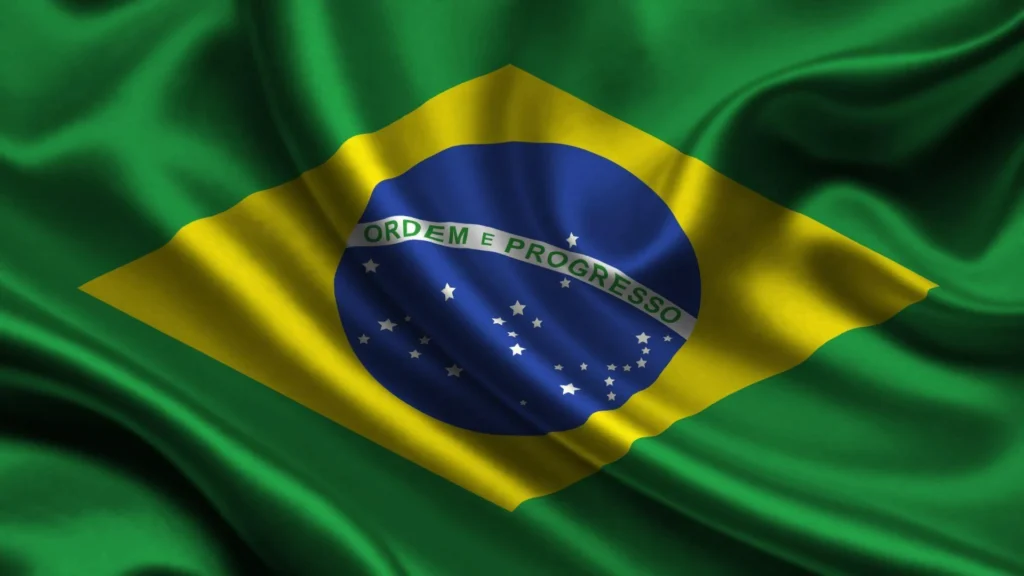
National Flag of Brazil
Brazil, on the other hand, boasts a vast and diversified economy, fueled by abundant natural resources and a robust industrial base. Agriculture plays a central role in Brazil’s economy, with the country being a leading exporter of commodities such as soybeans, coffee, and beef. Furthermore, Brazil has a strong manufacturing sector, particularly in automotive, aerospace, and machinery production. The country is also a global leader in renewable energy, with significant investments in hydropower, wind, and biofuels.
Despite facing economic challenges in recent years, including recession and political instability, Brazil has shown signs of recovery, with GDP growth rates rebounding and structural reforms underway to enhance competitiveness and attract investment.
In terms of trade patterns, both Bangladesh and Brazil have diverse export profiles, offering a range of products and services for international markets. While Bangladesh’s exports are primarily dominated by textiles and garments, Brazil exports a mix of agricultural commodities, manufactured goods, and raw materials. This diversity presents opportunities for complementary trade relationships and value chain integration between the two countries.
While Bangladesh and Brazil differ in terms of economic structure and development priorities, they share common goals of economic growth, job creation, and poverty alleviation. Moreover, both nations face similar challenges such as infrastructure gaps, skill shortages, and environmental sustainability concerns. These similarities provide a fertile ground for collaboration and knowledge exchange, where each country can leverage its strengths to address shared challenges and pursue mutual prosperity.
As businesses explore opportunities for collaboration between Bangladesh and Brazil, understanding these similarities and differences is crucial for devising effective strategies and unlocking the full potential of this burgeoning partnership. Whether it’s leveraging Bangladesh’s expertise in textiles and Brazil’s agribusiness prowess or tapping into Brazil’s technological advancements and Bangladesh’s entrepreneurial spirit, the possibilities for collaboration are vast and promising.
Key Industries for Collaboration:
Key Industries for Collaboration between Bangladesh and Brazil:
- Agriculture: Both Bangladesh and Brazil have significant agricultural sectors, albeit with different focuses. Brazil is a global powerhouse in agribusiness, known for its large-scale production of soybeans, sugarcane, coffee, and beef. Bangladesh, on the other hand, is renowned for rice production and fisheries. Collaboration in agriculture could involve knowledge exchange, technology transfer, and joint research initiatives to improve productivity, enhance food security, and explore new markets.
- Textiles and Garments: Bangladesh is one of the world’s largest exporters of textiles and garments, while Brazil has a burgeoning textile industry. Collaboration in this sector could involve vertical integration, where Brazilian textile manufacturers provide raw materials to Bangladeshi garment factories, taking advantage of Bangladesh’s expertise in garment manufacturing and Brazil’s cotton production capabilities. Joint ventures could also explore sustainable practices and innovative technologies to improve efficiency and reduce environmental impact.
- Technology: Both Bangladesh and Brazil have made strides in the technology sector, with growing IT industries and a burgeoning startup ecosystem. Collaboration in technology could involve partnerships between Brazilian and Bangladeshi tech companies to develop innovative solutions for common challenges in areas such as e-commerce, fintech, healthcare, and education. Joint ventures could also facilitate technology transfer and skill development through exchange programs and collaborative research projects.
- Renewable Energy: Brazil is a global leader in renewable energy, particularly in hydropower and biofuels, while Bangladesh has been investing in renewable energy sources such as solar and wind power to meet its growing energy demands sustainably. Collaboration in renewable energy could involve sharing best practices, technology transfer, and joint investment in renewable energy projects. Partnerships could focus on developing solar and wind farms, promoting energy efficiency, and implementing smart grid solutions to enhance energy security and mitigate climate change.
- Infrastructure Development: Both Bangladesh and Brazil face infrastructure challenges, including transportation, logistics, and urban development. Collaboration in infrastructure development could involve joint ventures or public-private partnerships to finance and execute large-scale infrastructure projects such as roads, bridges, ports, and urban infrastructure. Brazilian expertise in construction and engineering combined with Bangladeshi market knowledge and investment opportunities could create significant synergies and opportunities for collaboration.
In summary, collaboration between Bangladesh and Brazil in key industries such as agriculture, textiles, technology, renewable energy, and infrastructure development holds immense potential for mutual benefit. By leveraging each other’s strengths, resources, and expertise, both countries can drive innovation, create jobs, and foster sustainable economic growth. Joint ventures, partnerships, and knowledge exchange initiatives are essential for unlocking the full potential of this dynamic collaboration and shaping a brighter future for both nations.
Products Bangladesh Can Export to Brazil:
- Textiles and Garments: Bangladesh is renowned globally for its textile and garment industry, offering a wide range of products including knitwear, woven garments, and textiles. These products are in high demand worldwide and can cater to Brazil’s fashion and apparel market.
- Jute and Jute Goods: Bangladesh is the world’s largest producer of jute fiber and jute goods. Jute products such as sacks, bags, carpets, and textiles have various industrial and commercial applications. Brazil could import these eco-friendly products for packaging, construction, and home decor purposes.
- Pharmaceuticals: Bangladesh has a growing pharmaceutical industry known for producing high-quality generic drugs at competitive prices. Brazil could benefit from importing pharmaceutical products such as medicines, vaccines, and healthcare supplies from Bangladesh.
- Ceramic Tiles: Bangladesh has a thriving ceramic industry, producing a variety of ceramic tiles for flooring and wall applications. Brazilian construction and interior design sectors could import these ceramic tiles to meet the demand for modern and durable building materials.
- Leather and Leather Goods: Bangladesh produces a wide range of leather products including footwear, bags, and accessories. Brazilian consumers have a growing interest in fashionable leather goods, making Bangladesh an attractive source for importing quality leather products.
- Frozen Seafood: Bangladesh has a rich marine resource base and a growing seafood processing industry. Frozen seafood products such as shrimp, fish, and crab are popular in international markets and could find a niche in Brazil’s seafood market.
- IT and Software Services: Bangladesh’s IT industry has been experiencing rapid growth, offering a range of software development, IT outsourcing, and digital services. Brazilian businesses could benefit from outsourcing IT projects to Bangladeshi companies for cost-effective solutions and expertise in software development.
- Home Textiles: Bangladesh is a leading exporter of home textile products such as towels, bed linens, and curtains. These high-quality and affordable textile products could cater to Brazil’s home furnishing and hospitality sectors.
- Ceramic Tableware: Bangladesh produces ceramic tableware items such as dinnerware, plates, and bowls. Brazilian consumers have a growing interest in stylish and functional tableware products, presenting an opportunity for Bangladesh to export its ceramic products to Brazil.
- Agro-processed Foods: Bangladesh produces a variety of agro-processed foods such as snacks, spices, and packaged foods. These value-added food products could appeal to Brazilian consumers looking for convenient and flavorful food options.
Products Brazil Can Export to Bangladesh:
- Soybeans and Soy Products: Brazil is one of the world’s largest producers and exporters of soybeans and soy products such as soybean oil and soybean meal. These products are essential for Bangladesh’s livestock feed industry and edible oil refining sector.
- Coffee: Brazil is renowned for its high-quality coffee beans, accounting for a significant share of the global coffee market. Bangladesh could import Brazilian coffee beans to meet the growing demand for coffee consumption in the country.
- Aircraft and Aerospace Products: Brazil has a strong aerospace industry, producing aircraft, helicopters, and aerospace components. Bangladesh could import Brazilian aircraft and aerospace products to modernize its aviation sector and expand its fleet.
- Sugar: Brazil is a major producer and exporter of sugar, supplying a significant portion of the world’s sugar demand. Bangladesh could import Brazilian sugar to meet its domestic sugar consumption needs and support its food processing industry.
- Meat and Poultry: Brazil is a leading exporter of meat and poultry products, including beef, chicken, and pork. Bangladesh could import Brazilian meat and poultry products to meet the protein requirements of its growing population and support its food processing industry.
- Ethanol: Brazil is a global leader in ethanol production, primarily derived from sugarcane. Bangladesh could import Brazilian ethanol as a renewable fuel source to reduce dependence on fossil fuels and promote environmental sustainability.
- Mining and Mineral Products: Brazil has abundant mineral resources, including iron ore, bauxite, and gold. Bangladesh could import Brazilian mining and mineral products for industrial use, infrastructure development, and manufacturing purposes.
- Footwear: Brazil produces a wide range of footwear products, including leather shoes, sandals, and sneakers. Bangladeshi consumers have a growing interest in fashionable and durable footwear, making Brazil an attractive source for importing footwear products.
- Machinery and Equipment: Brazil manufactures a variety of machinery and equipment for industrial, agricultural, and construction purposes. Bangladesh could import Brazilian machinery and equipment to modernize its manufacturing sector and improve productivity.
- Chemicals and Petrochemicals: Brazil produces a range of chemicals and petrochemicals used in various industries such as agriculture, manufacturing, and pharmaceuticals. Bangladesh could import Brazilian chemicals and petrochemicals for industrial processes, production of consumer goods, and infrastructure development.

Major Export Items of Brazil
To read 2nd part of this article, click here!
How can Trade & Investment Bangladesh Assist?
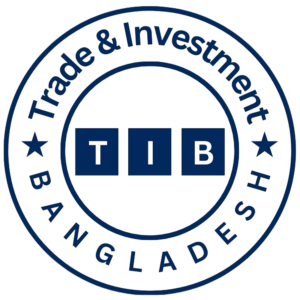
Trade & Investment Bangladesh
Trade & Investment Bangladesh (TIB) plays a pivotal role in facilitating trade and investment cooperation between businesses in Bangladesh and businesses in Brazil through a range of strategic initiatives and support services. By leveraging its expertise and networks, TIB can assist businesses in both countries in establishing fruitful partnerships and unlocking new opportunities for growth and collaboration. Here’s how TIB can utilize various tools and approaches to foster trade and investment cooperation:
- Business Mentorship: TIB can provide business mentorship programs tailored to the specific needs and challenges of Bangladeshi and Brazilian businesses looking to expand into each other’s markets. Experienced mentors can offer guidance on market entry strategies, regulatory compliance, cultural considerations, and business development best practices. Mentorship programs can empower businesses with the knowledge, skills, and confidence to navigate unfamiliar markets and build successful partnerships.
- Product Positioning: TIB can assist businesses in positioning their products effectively in the Bangladeshi and Brazilian markets to maximize market penetration and competitiveness. Through market research, consumer insights, and strategic analysis, TIB can help businesses identify unique selling propositions, target customer segments, and tailor product offerings to meet local preferences and demands. Effective product positioning can enhance brand visibility, differentiation, and appeal, driving sales and market share growth.
- Buyers-Sellers Matchmaking: TIB can facilitate matchmaking events and trade missions that bring together buyers and sellers from Bangladesh and Brazil to explore potential business opportunities and establish commercial partnerships. By organizing business matchmaking sessions, networking events, and trade fairs, TIB can create platforms for businesses to showcase their products, engage with potential partners, and negotiate trade agreements. These matchmaking initiatives can facilitate direct interactions, build trust, and catalyze business deals between Bangladeshi and Brazilian companies.
- Organizing Product Exhibitions: TIB can organize product exhibitions and trade shows in Bangladesh and Brazil to showcase the diverse range of products and services available from both countries. These exhibitions provide businesses with opportunities to demonstrate their capabilities, connect with prospective buyers and distributors, and generate leads for future collaborations. By facilitating face-to-face interactions and product demonstrations, TIB can stimulate interest, foster relationships, and drive business development efforts for participating companies.
- Development of Distribution Channels: TIB can support businesses in establishing and expanding distribution channels in Bangladesh and Brazil to reach wider audiences and increase market penetration. Through market assessments, partner identification, and logistical support, TIB can assist companies in identifying distribution partners, negotiating agreements, and optimizing supply chain operations. Developing robust distribution channels ensures efficient product delivery, enhances customer accessibility, and strengthens market presence for businesses entering new markets.
In summary, Trade & Investment Bangladesh (TIB) plays a crucial role in facilitating trade and investment cooperation between businesses in Bangladesh and businesses in Brazil through business mentorship, product positioning, buyers-sellers matchmaking, organizing product exhibitions, and development of distribution channels. By leveraging these tools and approaches, TIB can empower businesses to seize opportunities, overcome challenges, and forge successful partnerships that drive mutual growth and prosperity.
Business Opportunities between Bangladesh and Brazil

Md. Joynal Abdin, Business Consultant & Digital Marketer
Mr. Md. Joynal Abdin is a Business Consultant & Digital Marketer based in Dhaka, Bangladesh. He is Founder & CEO, Trade & Investment Bangladesh; Secretary General of Brazil Bangladesh Chamber of Commerce & Industry (BBCCI) and Co-Founder & CEO of Bangladesh Trade Center. Previously he served at Dhaka Chamber of Commerce & Industry (DCCI) as Executive Secretary; DCCI Business Institute (DBI) as Executive Director; SME Foundation as Deputy Manager; and the Federation of Bangladesh Chambers of Commerce & Industry (FBCCI) as Assistant Secretary.
The list of services Mr. Abdin is offering includes but not limited to Business Mentorship, Business Research and Documentations, Export Market Selection and Product Positioning at Home and Abroad; Buyers-Sellers Matchmaking; Website Development; Search Engine Optimization (SEO); and Social Media Marketing etc.
Business Opportunities between Bangladesh and Brazil
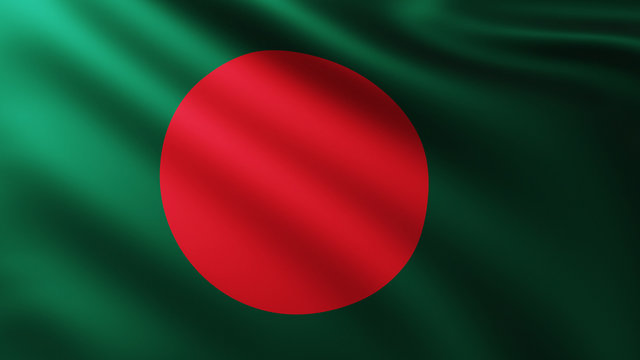
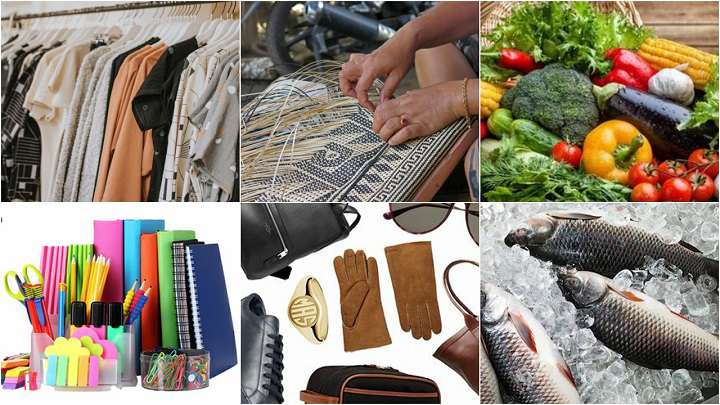
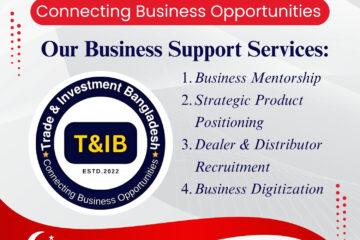

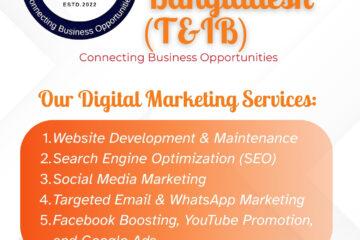
0 Comments